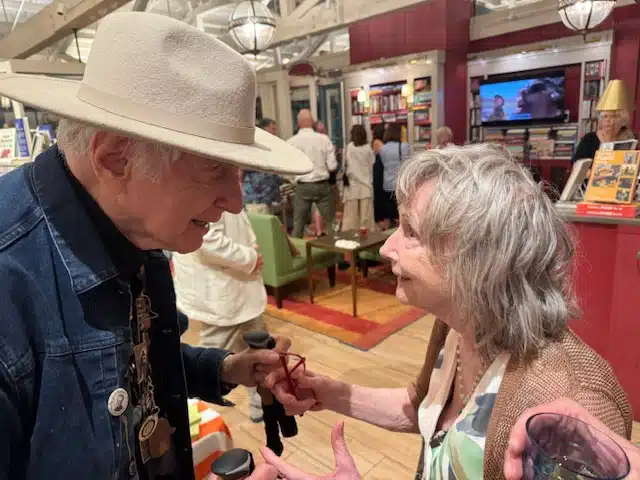“The State of Gonzo Address”
By Ron Whitehead GonzoFest Louisville co-founder and Chief Poetics
The first time Jack Nicholson called he was furious, pissed off, screaming. It was August 1995 and my grandmother, Louverine Render, had died. Right after the funeral my family and I headed out, in a rented car, for a 5,000-mile-out-West road trip. Hunter S. Thompson had invited us for a visit. I had published his Nixon obituary, “He Was a Crook,” as a limited edition broadside and it was getting big attention from collectors around the world. Taking the back roads to Pike’s Peak then Independence Pass through Aspen to Woody Creek I drove nonstop to Owl Farm. My kids knew about Hunter. When we pulled up next to The Red Shark and got out there was a god awful screaming crying pleading that sounded like a baby being eaten alive by a bear. Hunter’s sound system was blaring across the yard into the mountains. Hunter welcomed us in. He offered me drugs. He handed me alcohol. Then Jack Nicholson called, screaming. There were three calls from Jack while we were there. He had come out for the weekend to watch a boxing match with Hunter. Hunter, not knowing Jack had brought his daughters, slipped over to Jack’s house, broke out a window and threw several hundred lit fire crackers into the house. Scared the hell out of Jack’s kids. Jack was pissed. That was the first call. By the second call Jack and his daughters were calming down. He didn’t call Hunter as many names. By the third call everything was fine, all was forgiven.
Keep reading here Further on, comes something by me: Spreading The Gonzo Gospel
Margaret A. Harrell
Would Hunter stand for all of this recognition?
Of course Hunter would like to be known, to be recognized. And he’d be quite touched, really, by so much work behind the scenes. He would still like to steal away on his own and guard his privacy. But those are not mutually exclusive. So he’d say a big thank you — in his own way. Perhaps in opposite words. But he’d mean it that he was touched. And he’d also find just as many ways to be a private person. He wouldn’t sit tight and take anything for granted. Life would still have to be as full of surprises. Ultimately, he had to be satisfied with himself. No one could do that for him.
I think Hunter would be very pleased with all the attention he’s receiving now, including in Louisville, his hometown. It wouldn’t change his assessment of himself in any way. He wouldn’t let it go to his head. But he got energized by reader reactions and editorial responses. So he would “love the hell out of it” and also take it naturally. It wouldn’t change his universe, but it would touch him. He wasn’t good at self-promoting, not even at giving speeches for a crowd usually, so he wouldn’t have in any way advertised for himself. Somebody else had to do it. And about time. I totally agree with this comment: ‘We must look deep into Hunter S. Thompson’s work and discover the multi-layered messages.’ Just look at all his quotes online, like ‘Luck is a very thin wire between survival and disaster, and not many people can keep their balance on it.’ Said like the best. Recently, in the parade in Paris after the shooting at the satirical press offices, I saw — out of nowhere — in the crowd of marchers on TV, one wielding a sign that displayed a Gonzo fist holding — a pen. So Hunter lives on, speaking out — catching you by surprise, without a word — in places like Paris. Margaret A. Harrell, Hunter’s friend, Hell’s Angels copy editor, author (including the memoir Keep This Quiet! My Relationship with Hunter S. Thompson, Milton Klonsky, and Jan Mensaert), teacher, editor and cloud photographer.


